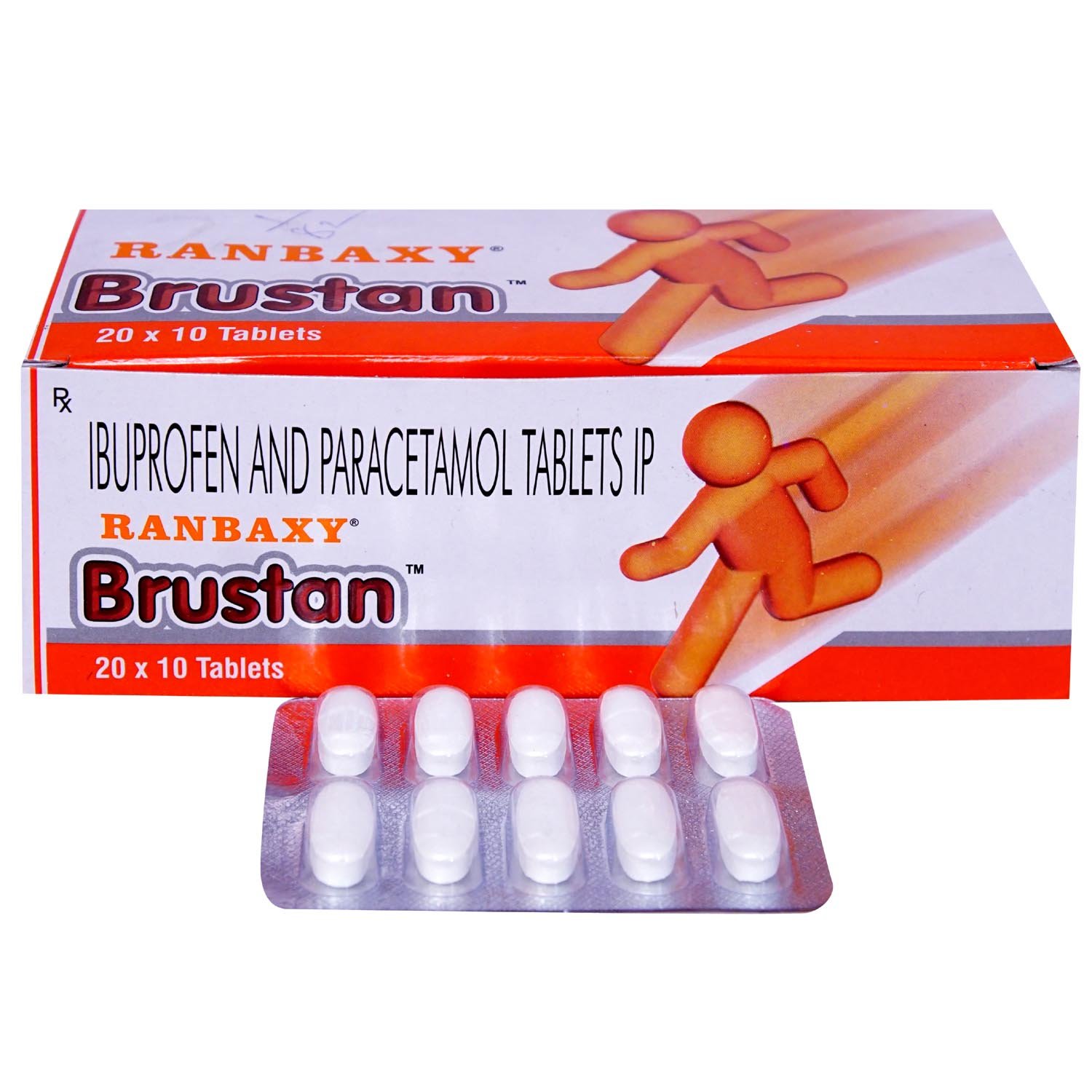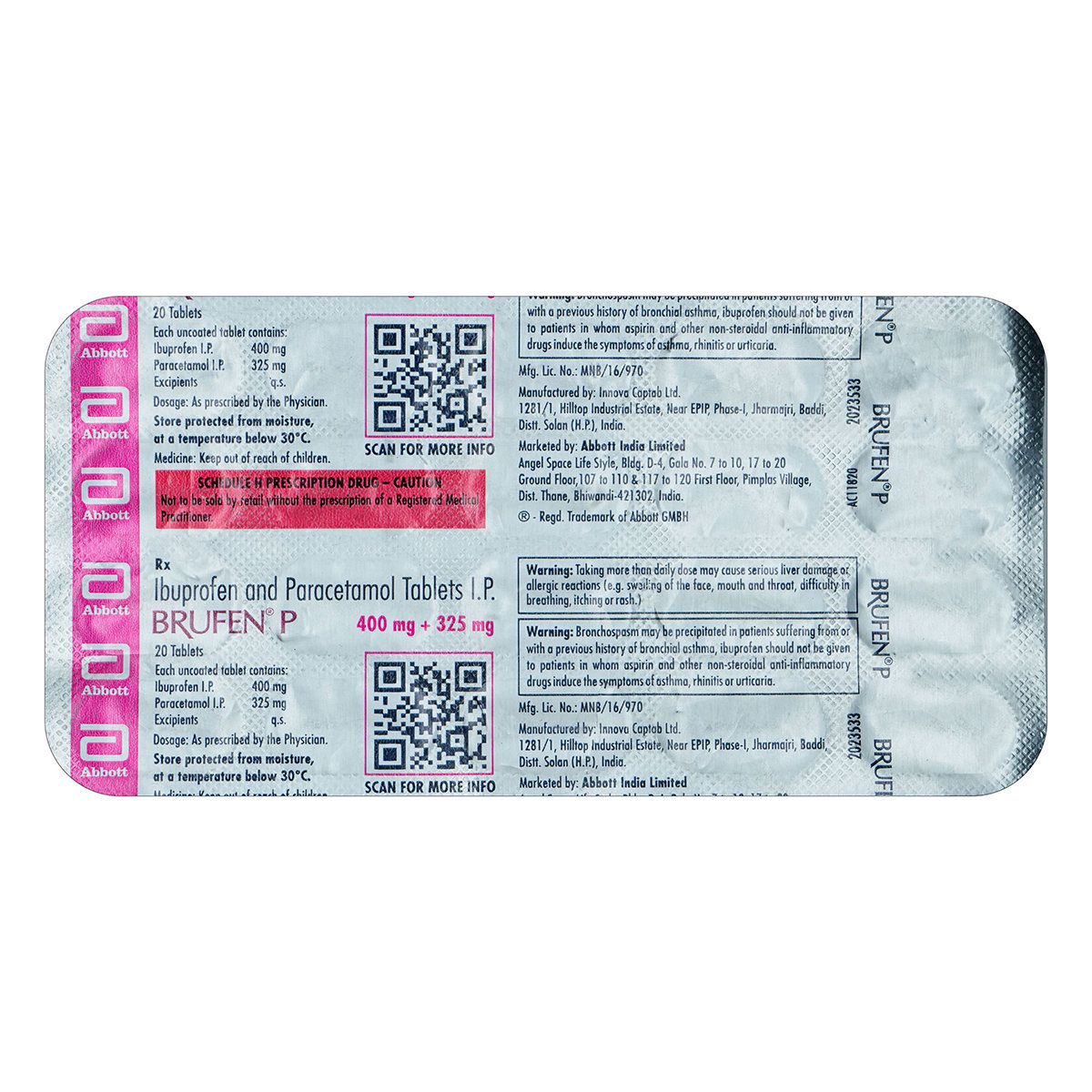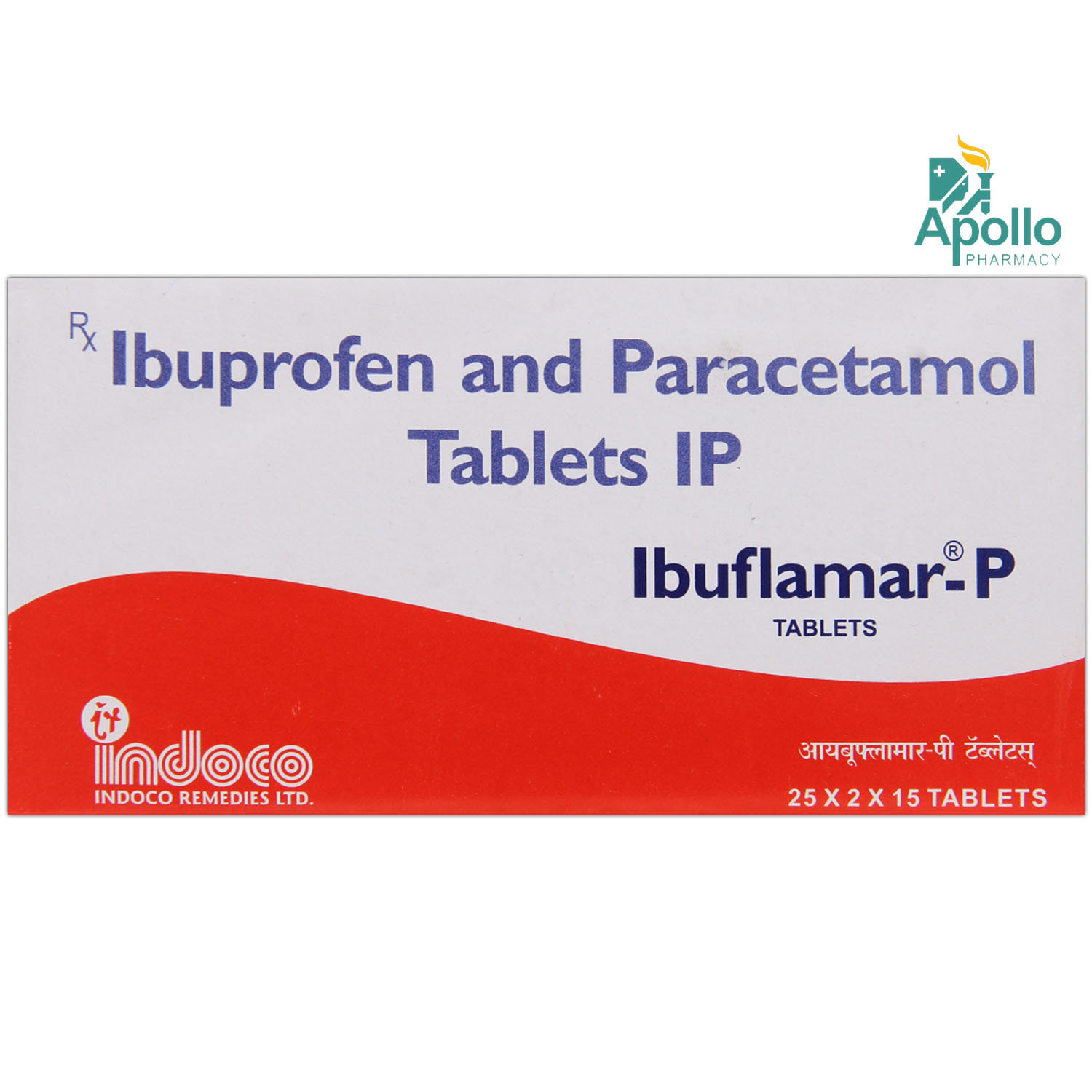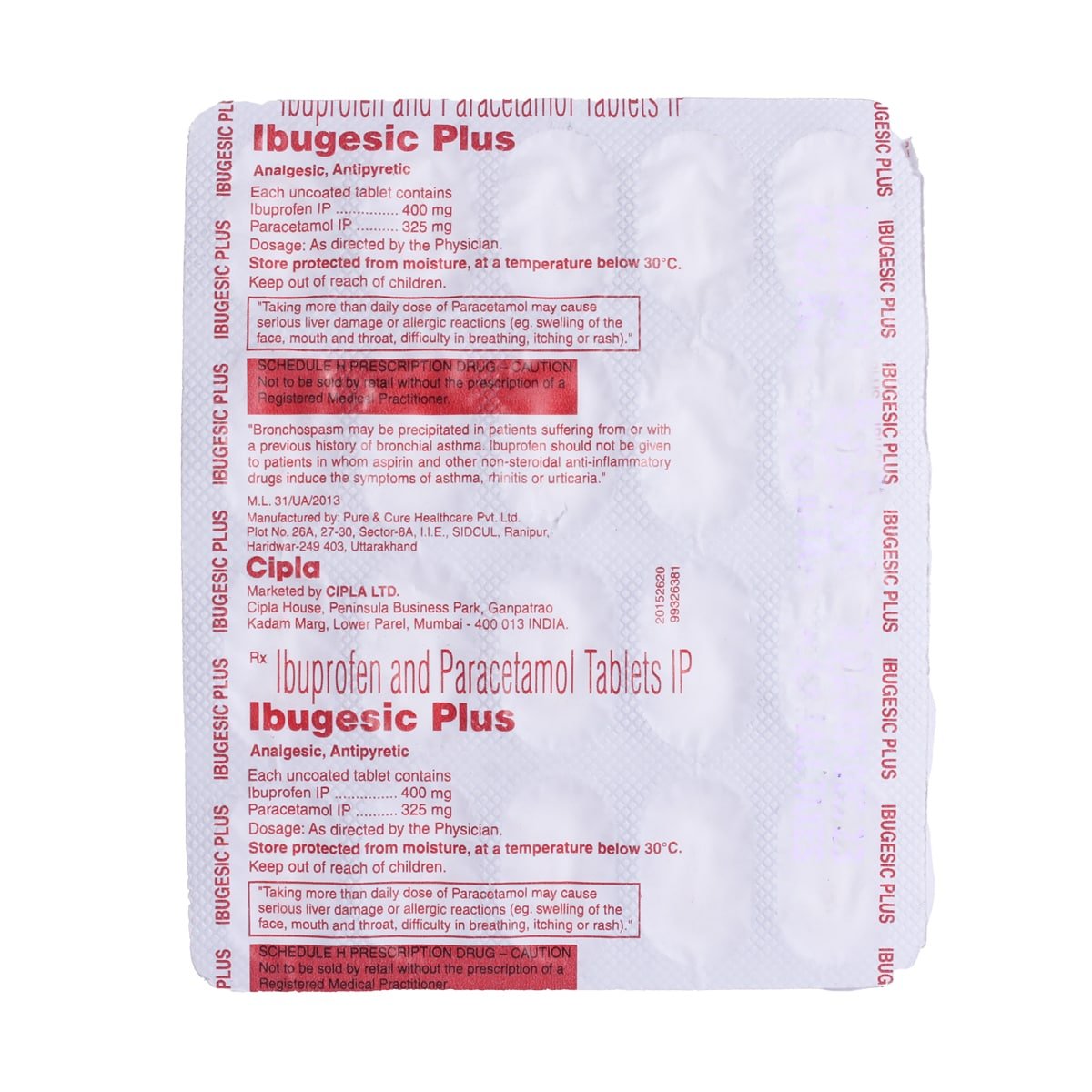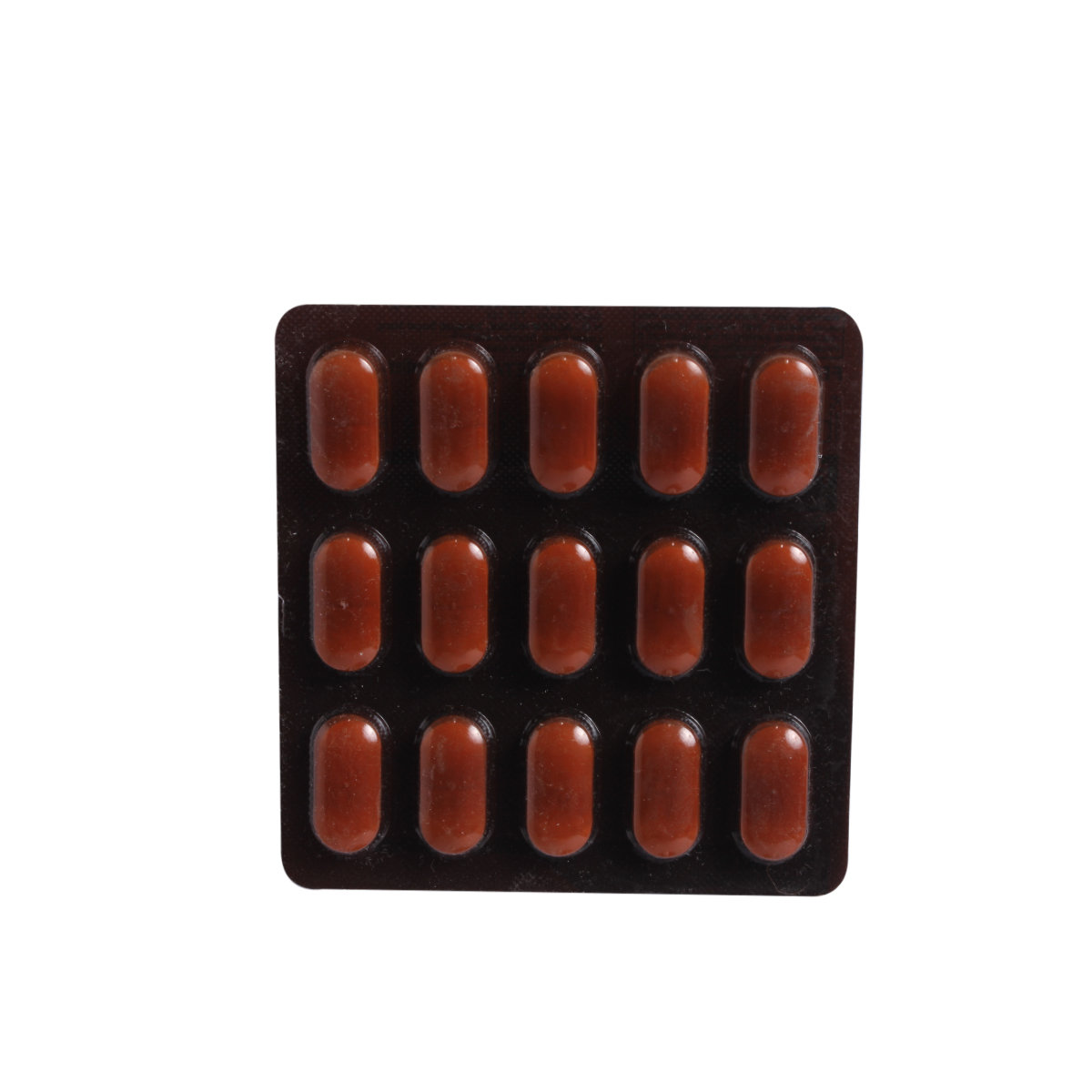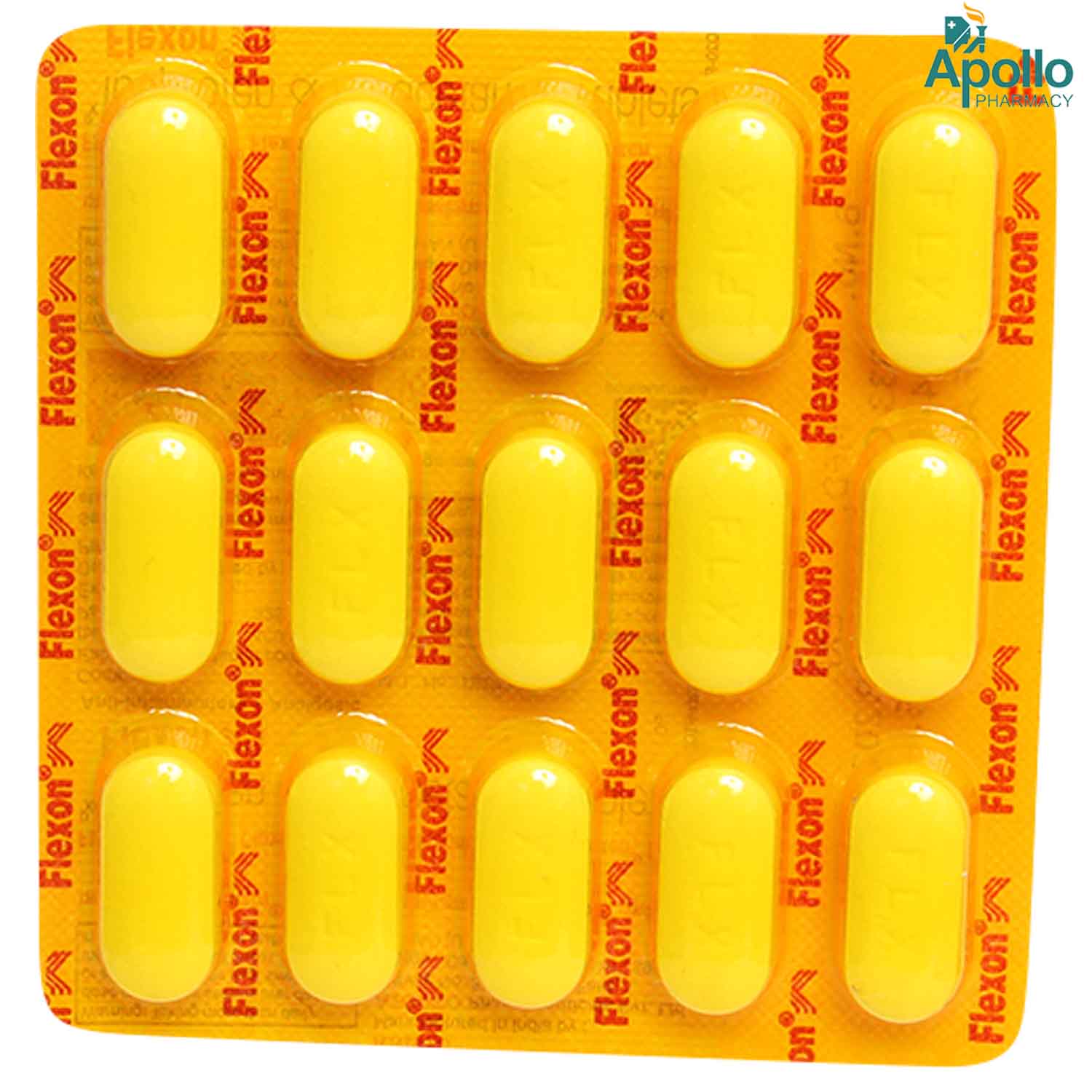Fenmol 400 mg/325 mg Tablet


MRP ₹12.96
(Inclusive of all Taxes)
₹1.9 Cashback (15%)
Provide Delivery Location
Online payment accepted
 Prescription drug
Prescription drugWhats That
Composition :
Manufacturer/Marketer :
Consume Type :
Return Policy :
About Fenmol 400 mg/325 mg Tablet
Fenmol 400 mg/325 mg Tablet belongs to a class of painkillers called non-steroidal anti-inflammatory drugs (NSAIDs). It relieves symptoms of muscle pain, arthritis pain, dysmenorrhea (painful periods or menstrual cramps), and dental pain and reduces fever. Pain can be temporary (acute) or long-lasting (chronic). Acute pain is for a short time caused by damage to the tissues of the muscle, bone, or other organs. In contrast, chronic pain lasts for a long duration and is caused due to pathologies like nerve damage, osteoarthritis etc. Besides this, it is also useful for dental pain, which can occur due to damage to the tooth nerve, infection, decay, extraction or injury.
Fenmol 400 mg/325 mg Tablet is composed of two medicines, namely Ibuprofen and Paracetamol. Ibuprofen is known to have an analgesic and anti-inflammatory effect for reducing mild to moderate pain. It works by blocking the effect of a chemical known as prostaglandin, responsible for inducing pain and inflammation in our body. Paracetamol acts as a mild analgesic and antipyretic (fever reducer). It lowers the elevated body temperature and mild pain by inhibiting the synthesis of a chemical messenger (prostaglandin) and promoting heat loss (through sweating) that helps reset the hypothalamic thermostat. Together, these two medicines help reduce mild to moderate pain in a shorter duration.
Fenmol 400 mg/325 mg Tablet is available in both oral tablet and syrup dosage forms. You should take the syrup form of Fenmol 400 mg/325 mg Tablet with food or as your doctor advises. The tablet form of Fenmol 400 mg/325 mg Tablet should be swallowed whole with a glass of water. Do not crush, chew or break it. Do not take Fenmol 400 mg/325 mg Tablet if your pain lasts more than ten days or your fever lasts more than three days. Do not take a double dose if you missed one dose. Like all medicines, Fenmol 400 mg/325 mg Tablet may cause side effects, although not everybody gets them. Stop taking this medicine if you experience symptoms like the tightness of the chest, breathing difficulties, fever, skin rashes, increased heart rate and or in case of any signs of hypersensitivity.
Do not take Fenmol 400 mg/325 mg Tablet if you are allergic to painkillers like aspirin, ibuprofen, naproxen, or diclofenac. It is not recommended for use in children, people with liver disease, heart disease or gastric ulcers/bleeding problems. Fenmol 400 mg/325 mg Tablet may be associated with a small increase in the risk of heart attack (myocardial infarction). Avoid consumption of alcohol as it may damage your liver and cause increased side effects on taking this drug. Consult your doctor if your pain, inflammation, and fever symptoms do not disappear even after ten days.
Uses of Fenmol 400 mg/325 mg Tablet
Directions for Use
Key Benefits
Fenmol 400 mg/325 mg Tablet comprises Ibuprofen and Paracetamol primarily used to treat mild to moderate pain. Fenmol 400 mg/325 mg Tablet is prescribed mainly to treat pain and relieve discomfort caused by conditions like tooth pain, arthritis, period pain and other types of short-term pains. It helps treat pain by blocking the chemical messenger (prostaglandin) in the brain responsible for causing pain. Ibuprofen works by blocking the effect of a chemical known as prostaglandin, responsible for inducing pain and inflammation in our body. On the other hand, Paracetamol lowers the elevated body temperature and mild pain by inhibiting the synthesis of prostaglandin by promoting heat loss (through sweating) that helps reset the hypothalamic thermostat. Paracetamol has the advantage of producing less gastric irritation than other painkillers like aspirin.
Storage
- Drink water or other clear fluids.
- To prevent worsening of pain, limit intake of tea, coffee, or alcohol.
- Include bland foods like rice, toast, crackers, and rice in your diet.
- Avoid lying down immediately after eating as it may cause indigestion or heartburn.
- Avoid acidic and spicy food as it may cause indigestion.
- Drink fluids: Water, clear broth, or electrolyte-rich beverages.
- Follow a balanced diet, which would be rich in fruits, vegetables, whole grains, lean proteins, and healthy fats.
- Mindfulness: Manage stress with meditation, deep breathing or yoga.
- Stay away from smoke, dust and other irritants.
- Get adequate rest to facilitate recovery.
- Wash hands and avoid close contact, do not share personal items.
- Inform Your Doctor: Notify your doctor immediately about your diarrhoea symptoms. This allows them to adjust your medication or provide guidance on managing side effects.
- Stay Hydrated: Drink plenty of fluids to replace lost water and electrolytes. Choose water, clear broth, and electrolyte-rich drinks. Avoid carbonated or caffeinated beverages to effectively rehydrate your body.
- Follow a Bland Diet: Eat easy-to-digest foods to help firm up your stool and settle your stomach. Try incorporating bananas, rice, applesauce, toast, plain crackers, and boiled vegetables into your diet.
- Avoid Trigger Foods: Steer clear of foods that can worsen diarrhoea, such as spicy, fatty, or greasy foods, high-fibre foods, and dairy products (especially if you're lactose intolerant).
- Practice Good Hygiene: Maintain good hygiene to prevent the spread of infection. To stay healthy, wash your hands frequently, clean and disinfect surfaces regularly, and avoid exchanging personal belongings with others.
- Take Anti-Diarrheal Medications: If your doctor advises, anti-diarrheal medications such as loperamide might help manage diarrhoea symptoms. Always follow your doctor's directions.
- Keep track of your diarrhoea symptoms. If they don't get better or worse or are accompanied by severe stomach pain, blood, or dehydration signs (like extreme thirst or dark urine), seek medical help.
- High levels of liver enzymes need immediate medical attention.
- Watch your diet and consume low-fat foods, like green leafy vegetables, fish, whole grains, nuts, etc.
- Regularly do strengthening exercises to control your cholesterol levels.
- Avoid drinking alcohol as it can affect your liver.
- Focus on losing weight as it can help control cholesterol and maintain liver enzymes.
- Practice yoga and meditation to improve liver functioning and overall health.
Drug Warnings
Caution is advised in people with underlying sensitivity to aspirin and other pain killers. Fenmol 400 mg/325 mg Tablet is contraindicated in children below 12 years of age under 40 kg of weight. If treatment is required for more than three days, consult your doctor. Fenmol 400 mg/325 mg Tablet should be taken with caution if you have an allergy to paracetamol, ibuprofen, aspirin, or other pain killers, highly sensitive reactions (asthma, lip/face/throat swelling), existing stomach ulcer or bleeding associated pain killers, blood clotting disorder, heart diseases (like congestive heart failure), kidney disease, peptic ulcer, another active bleeding (like brain stroke bleeding), and severe dehydration (due to vomiting, diarrhoea). Liver damage might occur if taken for a longer duration as it contains paracetamol. The skin should be closely monitored as skin allergic reactions like Stevens-Johnson syndrome (SJS), and toxic epidermal necrolysis (TEN) have been reported with Fenmol 400 mg/325 mg Tablet. Blood pressure and cardiovascular (heart) status should be monitored closely during the treatment with Fenmol 400 mg/325 mg Tablet, especially in people affected with high blood pressure and who have a history of heart failure.
Drug-Drug Interactions
Drug-Drug Interactions
Login/Sign Up
Taking Ketorolac and Fenmol 400 mg/325 mg Tablet can increase the risk of side effects in the gastrointestinal tract such as inflammation, bleeding and ulceration.
How to manage the interaction:
Taking Ketorolac and Fenmol 400 mg/325 mg Tablet together is not recommended as it can lead to an interaction, it can be taken if advised by your doctor. However, if you experience any symptoms like dizziness, lightheadedness, red or black, dark stools, coughing or vomiting fresh or dried blood that looks like coffee grounds, severe headache, and weakness, consult the doctor immediately. Do not stop using any medications without a doctor's advice.
Combining Meloxicam and Fenmol 400 mg/325 mg Tablet can increase the risk of side effects in the gastrointestinal tract such as inflammation, bleeding, ulceration, and rarely, perforation.
How to manage the interaction:
Taking Meloxicam and Fenmol 400 mg/325 mg Tablet together is not recommended as it can lead to an interaction, it can be taken if advised by your doctor. However, if you experience any symptoms like dizziness, lightheadedness, red or black, dark stools, coughing or vomiting fresh or dried blood that looks like coffee grounds, severe headache, and weakness, consult the doctor immediately. Do not stop using any medications without a doctor's advice.
The combined use of Ibrutinib and Fenmol 400 mg/325 mg Tablet can increase the risk of bleeding.
How to manage the interaction:
Taking Ibrutinib and Fenmol 400 mg/325 mg Tablet together can lead to an interaction, it can be taken if advised by a doctor. However, if you experience any symptoms like unusual bleeding or bruising, dizziness, lightheadedness, red or black, tarry stools, coughing up or vomiting fresh or dried blood that looks like coffee grounds, severe headache, and weakness, consult a doctor immediately. Do not stop using any medications without a doctor's advice.
Coadministration of Fenmol 400 mg/325 mg Tablet and Apixaban co-administration may raise the risk of bleeding.
How to manage the interaction:
Even though combining Fenmol 400 mg/325 mg Tablet and Apixaban may cause an interaction, it is still possible to take it if your doctor advises you to. Consult a doctor if you experience symptoms like blood in your urine or stool (or a black stool), severe bruising, prolonged nosebleeds, feeling dizzy or lightheaded, weakness or severe headache, vomiting blood or coughing up blood, heavy menstrual bleeding (in women), difficulty breathing, or chest pain. Without consulting a doctor, never stop taking any medications.
The combined use of warfarin and Fenmol 400 mg/325 mg Tablet can cause bleeding easily.
How to manage the interaction:
Co-administration of Warfarin and Fenmol 400 mg/325 mg Tablet can lead to an interaction, it can be taken if advised by a doctor. However, if you experience any symptoms like unusual bleeding or bruising, vomiting, blood in your urine or stools, headache, dizziness, or weakness, consult the doctor immediately. Do not stop using any medications without a doctor's advice.
Coadministration of Tenofovir disoproxil and Fenmol 400 mg/325 mg Tablet can increase the risk of developing kidney problems.
How to manage the interaction:
Co-administration of Tenofovir disoproxil and Fenmol 400 mg/325 mg Tablet can lead to an interaction, it can be taken if advised by your doctor. However, if you experience any symptoms like nausea, vomiting, irregular urination, sudden weight gain or weight loss, shortness of breath, muscle cramps, weakness, and irregular heart rhythm, consult the doctor immediately. Do not stop using any medications without a doctor's advice.
Taking cidofovir and Fenmol 400 mg/325 mg Tablet can increase the risk of Kidney problems.
How to manage the interaction:
Taking Cidofovir and Fenmol 400 mg/325 mg Tablet can lead to an interaction, it can be taken if advised by your doctor. However, if you experience any symptoms like nausea, vomiting, loss of hunger, increased or decreased urination, sudden weight gain or weight loss , swelling, shortness of breath, bone pain, muscle cramps, tiredness, weakness, dizziness, confusion, consult the doctor immediately. Do not stop using any medications without a doctor's advice.
The combined use of Iomeprol and Fenmol 400 mg/325 mg Tablet can increase the risk of kidney damage.
How to manage the interaction:
Co-administration of Iomeprol and Fenmol 400 mg/325 mg Tablet can lead to an interaction, it can be taken if advised by your doctor. However, if you experience any symptoms like nausea, vomiting, loss of appetite, increased or decreased urination, sudden weight gain or weight loss, fluid retention, swelling, shortness of breath, muscle cramps, tiredness, weakness, dizziness, confusion, irregular heart rhythm, consult the doctor immediately. Do not stop using any medications without a doctor's advice.
Co-administration of Rivaroxaban and Fenmol 400 mg/325 mg Tablet can increase the risk of bleeding problems.
How to manage the interaction:
Co-administration of Rivaroxaban and Fenmol 400 mg/325 mg Tablet can lead to an interaction, it can be taken if advised by your doctor. However, if you experience any symptoms like unusual bleeding or bruising, dizziness, lightheadedness, red or black, tarry stools, coughing up or vomiting fresh or dried blood that looks like coffee grounds, severe headache, and weakness, consult the doctor immediately. Do not stop using any medications without a doctor's advice.
The use of Everolimus and Fenmol 400 mg/325 mg Tablet can increase the risk of kidney problems.
How to manage the interaction:
Co-administration of Everolimus and Fenmol 400 mg/325 mg Tablet can lead to an interaction, it can be taken if advised by a doctor. However, if you experience nausea, vomiting, loss of appetite, increased or decreased urination, sudden weight gain or weight loss, fluid retention, swelling, shortness of breath, muscle cramps, tiredness, weakness, dizziness, confusion, and irregular heart rhythm, consult the doctor immediately. Do not stop using any medications without a doctor's advice.
Drug-Food Interactions
Drug-Food Interactions
Login/Sign Up
Diet & Lifestyle Advise
- Include more glucosamine, chondroitin sulphate, vitamin D, and calcium-enriched supplements. Besides this, turmeric and fish oils can help reduce inflammation in the tissue.
- Please do not go for heavy exercise as it may increase your joint pain in arthritis. Instead, you can do low-impact aerobic exercises like walking on the treadmill, bike riding and swimming. You can also strengthen your muscles by lifting light weights.
- In the chronic condition of arthritis or joint pain, try to include fish like salmon, trout, tuna, and sardines. These fishes are enriched with omega-3 fatty acids that minimum level of chemical called cytokines, which ramp up inflammation.
- Your sitting posture is important, especially when you have pain and inflammation. Try to sit as little as possible and only for a short time. Long-term immobility is harmful in conditions like arthritis. Use back support like a rolled-up towel to minimise pain at the back of your spine curve. Keep your knees and hips at a right angle. Besides this, you can also use a footrest if required.
Side Effects of Fenmol 400 mg/325 mg Tablet
- Nausea
- Vomiting
- Diarrhoea
- Flatulence
- Constipation
- Thrombocytopenia (low level of platelets)
- Neutropenia/leucopenia (low white blood cells)
- Skin rashes (urticaria)
- Peptic ulcers
- Gastrointestinal bleeding
- Dyspepsia
- Abdominal pain
- Colitis (inflammation of the intestine)
- Inflammatory bowel disorder
Habit Forming
Therapeutic Class
All Substitutes & Brand Comparisons
RX
Out of StockBrugesicp 400 mg/325 mg Tablet
Biochem Pharmaceutical Industries Ltd
₹11.92
(₹0.72 per unit)
38% CHEAPERRX
Out of StockBrukol 400mg/325mg Tablet
₹8
(₹0.72 per unit)
38% CHEAPERRX
Out of StockBruace 400 mg/325 mg Tablet
Jagsonpal Pharmaceuticals Ltd
₹9.62
(₹0.87 per unit)
25% CHEAPER
Product Substitutes
Drug-Diseases Interactions
Drug-Diseases Interactions
Login/Sign Up
FAQs
Fenmol 400 mg/325 mg Tablet is comprised of two medications, Ibuprofen and Paracetamol. Fenmol 400 mg/325 mg Tablet has analgesic and anti-inflammatory properties that help relieve mild to moderate pain. Fenmol 400 mg/325 mg Tablet functions by inhibiting the production of specific chemical messengers that induce fever, discomfort, and inflammation (redness and swelling).
No, it is not advisable to take Fenmol 400 mg/325 mg Tablet with depression medication. Please inform your doctor if you are taking depression medicine before starting Fenmol 400 mg/325 mg Tablet.
Yes, Fenmol 400 mg/325 mg Tablet is a short term medication and if you feel better you can stop taking Fenmol 400 mg/325 mg Tablet, but only after consulting your doctor.
Fenmol 400 mg/325 mg Tablet is known to be contra-indicated in patients with allergy to painkillers (NSAIDs) or any of the components or excipients of this medicine. Its use should also be avoided in patients with history of stomach ulcer and kidney/liver disease.
Yes, Fenmol 400 mg/325 mg Tablet is known to cause dizziness. If you feel dizzy, please take rest and also avoid driving while you take Fenmol 400 mg/325 mg Tablet as it can be harmful.
No, Fenmol 400 mg/325 mg Tablet is not indicated for stomach pain. Also, If you have stomach pain post ingestion it may be a sign of stomach ulcer, or gastric bleeding. Do not take Fenmol 400 mg/325 mg Tablet in this condition. It is better to inform your doctor in case of stomach pain post ingestion of this medication.
It depends on whether your cough and cold pills contain ibuprofen and paracetamol or not. If it contains these two medicines, do not take it. It may lead to overdosage, thereby producing unpleasant side effects. Consult your doctor before taking it in such cases.
Fenmol 400 mg/325 mg Tablet is known to cause stomach upset in some cases. So, please take Fenmol 400 mg/325 mg Tablet with a meal or a glass of milk to avoid upset stomach.
No, Fenmol 400 mg/325 mg Tablet should not be taken as a long-term medication as it may lead to stomach ulcers/bleeding and kidney problems. For best results of Fenmol 400 mg/325 mg Tablet, please take it in doses and duration mentioned by your doctor.
Drug-Drug Interactions Checker List
- WARFARIN
- TICLOPIDINE
- METHOTREXATE
- METOCLOPRAMIDE
- DOMPERIDONE
- FUROSEMIDE
- PREDNISONE
- CIPROFLOXACIN
- THEOPHYLLINE
- EPHEDRINE
- CHOLESTYRAMINE
- DULOXETINE
Special Advise
- Let your doctor know if you are suffering from stomach ulcers as the Fenmol 400 mg/325 mg Tablet may enhance the same.
Disease/Condition Glossary
Pain: Pain can be short-term (acute) or long-term (chronic). Acute pain is for a short time caused by damage to the tissues of the muscle, bone, or organs. In contrast, chronic pain lasts for a longer duration. It is caused due to pathologies like nerve damage, Osteoarthritis, and dental pain due to damage to the tooth nerve, infection, decay, extraction, or injury. Many women have painful periods known as dysmenorrhea, most often menstrual cramps. On the other hand, Osteoarthritis is a degenerative disease that results in chronic pain in joints (especially the knee) and stiffness making daily tasks difficult.
Fever: Fever is not a disease but a sign that your body is trying to fight an infection or illness in which your body's immune system gets activated to fight infections caused by bacteria or viruses. A normal temperature is around 98.6 F but may vary from person to person. Fever is caused due to the 'pyrogen' released by the hypothalamus part of the brain. This pyrogen causes heat-generating effects to match a new higher temperature set point to fight infection.

Have a query?
Alcohol
Safe if prescribed
Taking Fenmol 400 mg/325 mg Tablet with alcohol may cause dizziness or drowsiness. Besides this, it can also damage your liver if taken for a longer duration. So, avoid or limit intake of alcoholic beverages with Fenmol 400 mg/325 mg Tablet.
Pregnancy
Consult your doctor
Use of Fenmol 400 mg/325 mg Tablet during pregnancy is not recommended as taking this medicine during the last 3 months of pregnancy may harm the unborn baby.
Breast Feeding
Consult your doctor
Take Fenmol 400 mg/325 mg Tablet only if prescribed by your doctor.
Driving
Safe if prescribed
After taking Fenmol 400 mg/325 mg Tablet you may notice dizziness, sleepiness, drowsiness or fatigue as it contains paracetamol which causes sedation. So, in this, you should stop taking Fenmol 400 mg/325 mg Tablet and contact your doctor.
Liver
Consult your doctor
Fenmol 400 mg/325 mg Tablet to be taken with caution, especially if you have a history of liver disease. Dose may have to be adjusted by your doctor.
Kidney
Consult your doctor
Fenmol 400 mg/325 mg Tablet to be taken with caution, especially if you have a history of Kidney diseases/conditions. Dose may have to be adjusted by your doctor.
Children
Safe if prescribed
Fenmol 400 mg/325 mg Tablet is contraindicated in children below 20 kg body weight or younger than 6 years of age. It may cause kidney problems in children and adolescents who are dehydrated.



